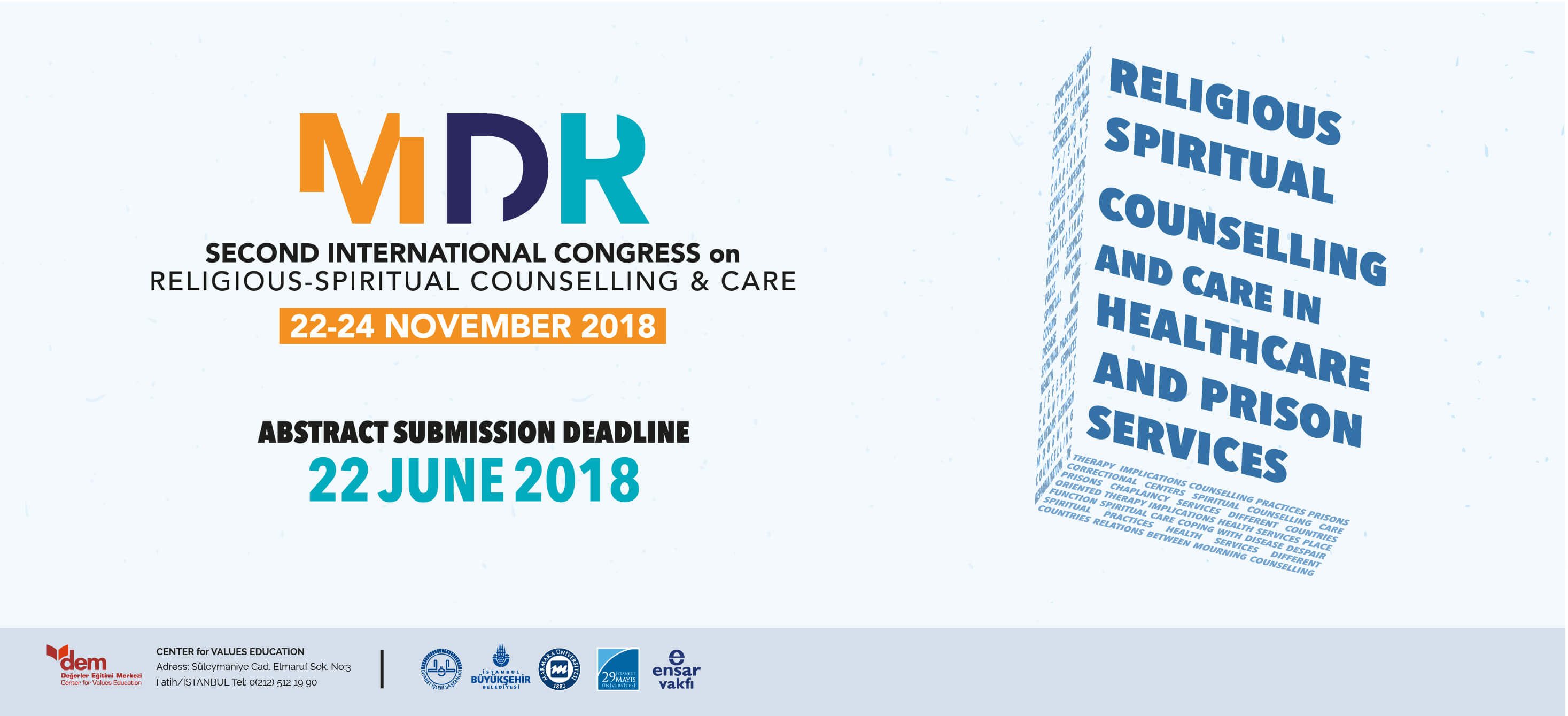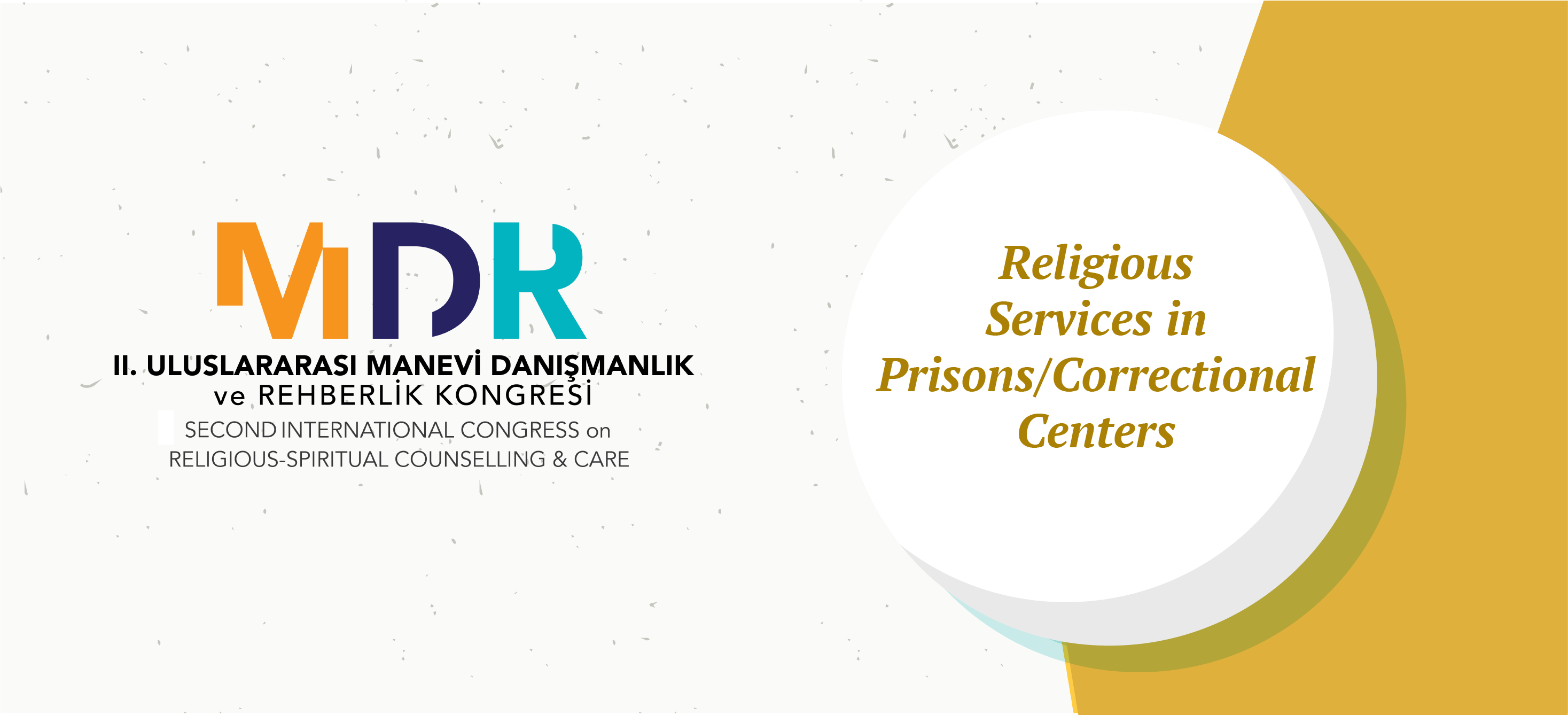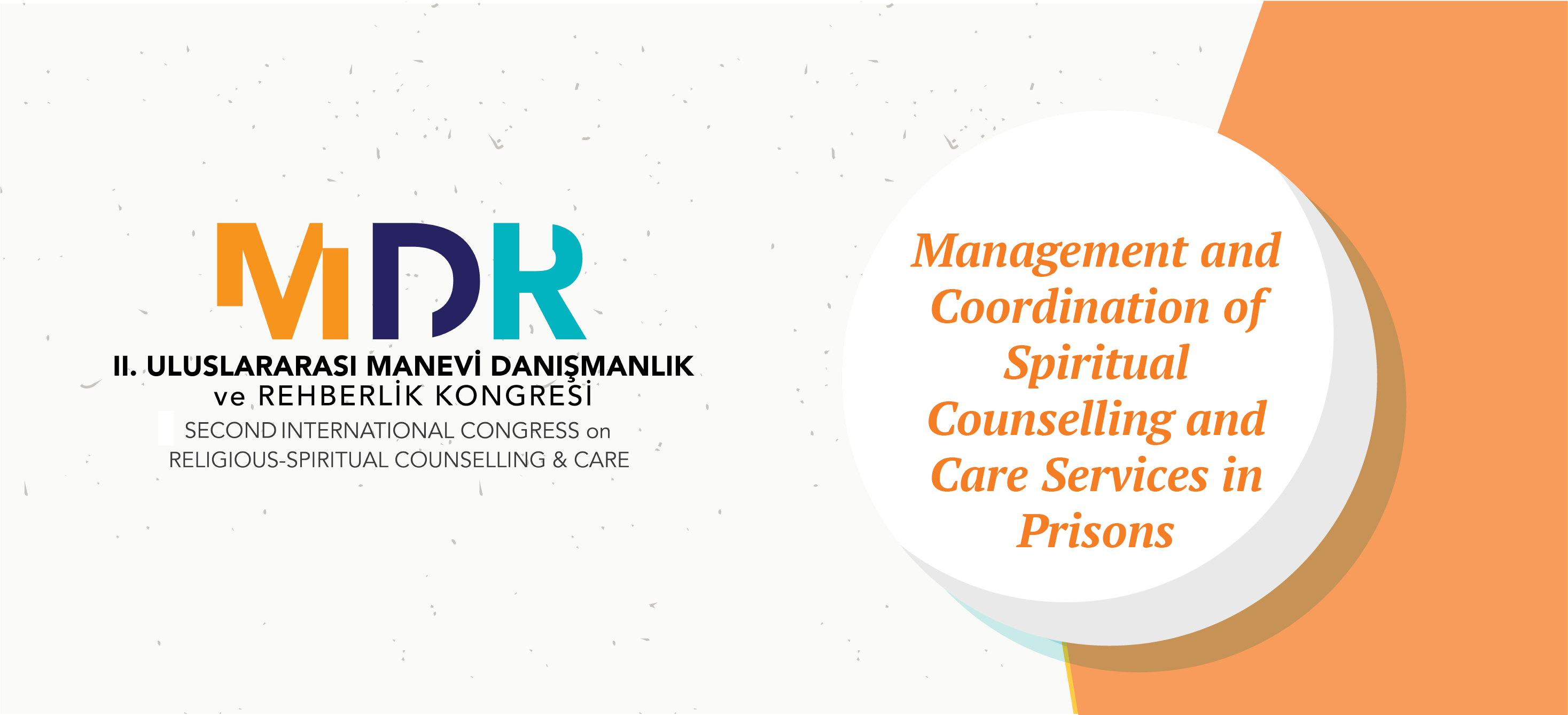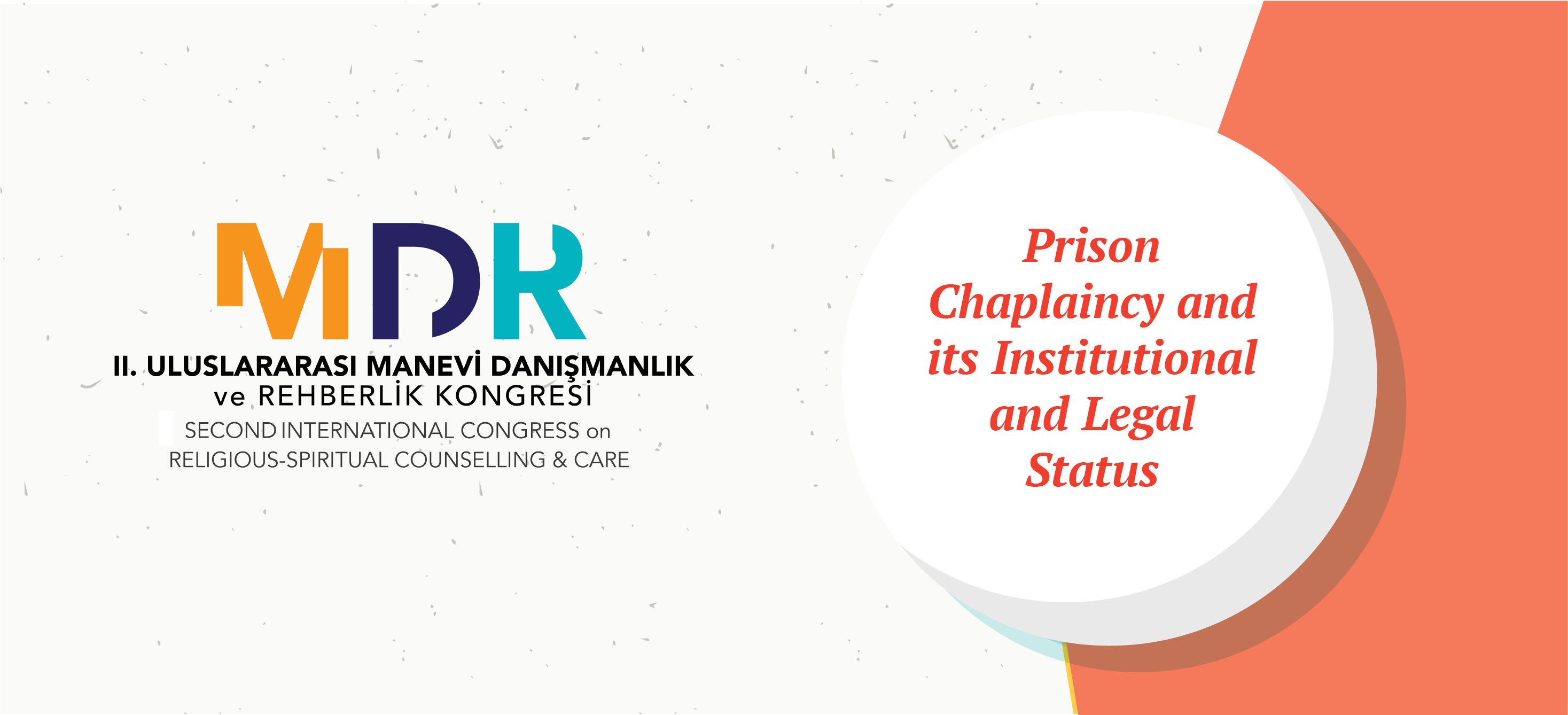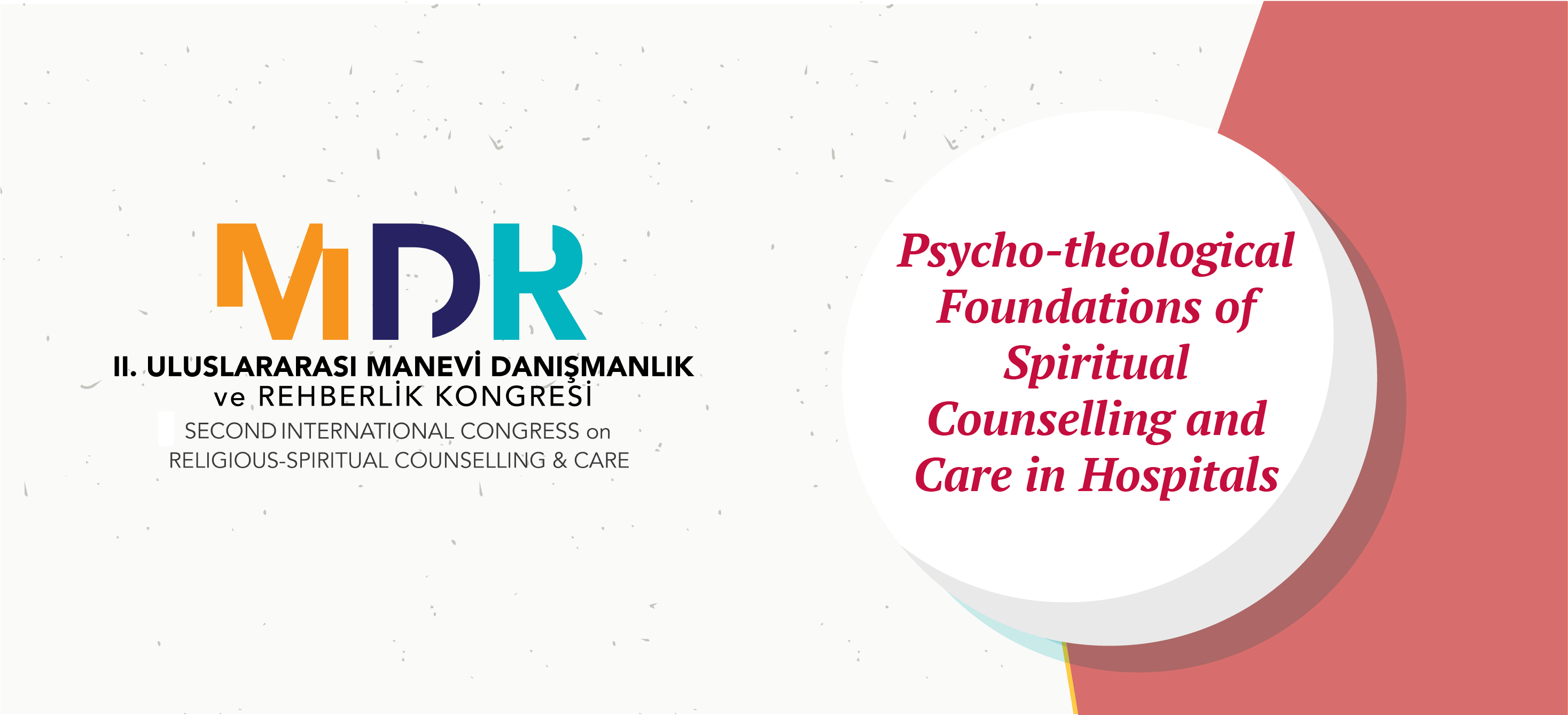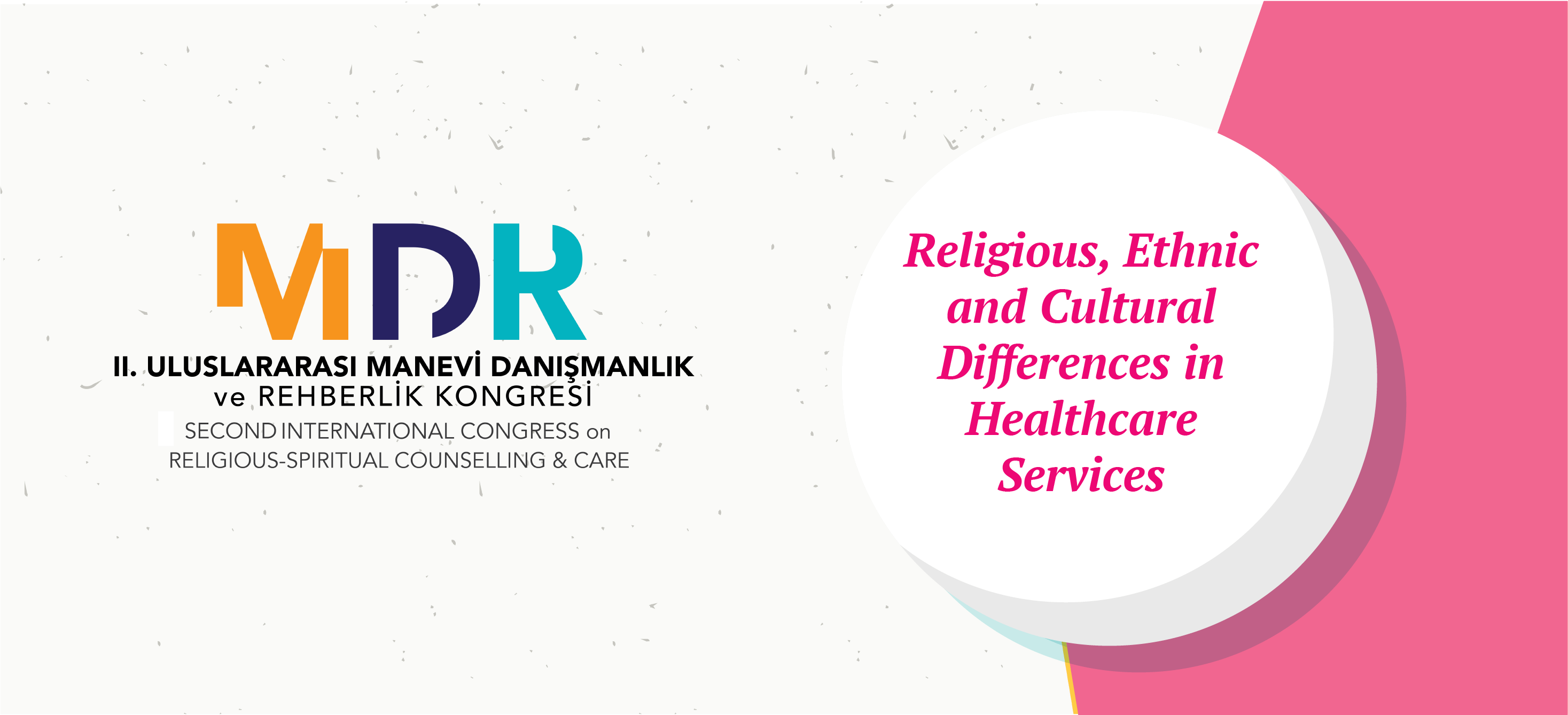DEADLINES
- 22 June, 2018 Abstract Submission Deadline
- 10 July, 2018 Announcement for Accepted Papers
- 15 October, 2018 Full text copy submission
- 22-24 November, 2018 Congress Date
- 22 June, 2018 : Abstract Submission Deadline
- 10 July, 2018 : Announcement for Accepted Papers
- 15 October, 2018 : Full text copy submission
- 22-24 November, 2018 : Congress Date
Click for program details.
Religion has contributed to society and individual in variety of areas like psycho-social, cultural, economic, solidarity/cooperation and humanitarian aids etc. It has been a source of inspiration and motivation to mobilize individuals, communities and institutions in order to cooperate, make solidarity, and social and moral support.
This international congress, entitled Spiritual Counselling and Care (SCC), emphasizes the human aspects of religious beliefs and moral values; to appreciate the contributions they make to individual and social life, and to raise a popular and academic awareness of the perception of religion that is touched by human life. In this context, it aims particularly to examine the place, role, function and contribution of religion and spirituality in family therapy, in reforming and rehabilitation of inmates in prisons, for being a source of hope and morale to patients in health care services in hospitals, in the formation of moral and motivation in the military, in creating spiritual atmosphere for elderly and disadvantaged groups in social services.
The first spiritual counselling and care scholarly gathering within the scope of this congress as planned series of conferences was held in April 2016 in Istanbul, Turkey. The main theme of the ‘1 st International Congress on Religious-Spiritual Counselling and Care’ was ‘The Place and Function of Spiritual Counselling and Care in Human Life’ aiming to give a broad coverage of all issues, practices and problems in the field. This upcoming and subsequent congressional themes will be continued in more specific areas. In the context of institutionalized service unit thematisation, the main theme of the ‘2 nd International Congress on Spiritual/Religious Counselling and Care’ that is scheduled to be held on November 22-24, 2018 will be on ‘Spiritual/Religious Counselling and Care in Prison and Healthcare Services.
By organising such a congress, it is expected to shed light on the future studies of spiritual and religious counselling and care by taking into account the rapidly developing field of expertise in Turkey from an interdisciplinary perspective at international platform.
Spiritual/Religious Counselling and Care in Prisons/Correctional Centers
- Religious Life in Prisons/Correctional Centers
- Violence, Criminality, Delinquency, Psychology of Criminals
- Radicalization in Prisons/Correctional Centers
- Religious and Spiritual Transformation in Prisons
- Religious Services in Prisons/Correctional Centers
- Management and Coordination of Spiritual Counselling and Care Services in Prisons
- Prison Chaplaincy and its Institutional and Legal Status
- Vocational and Professional Training for Prison Chaplaincy Staff
- Vocational Qualifications of Prison Chaplaincy Staff
- Inspection and Supervision for Spiritual Counselling and Care Services in Prisons
- Ethical Standards for Spiritual Counselling and Care Services in Prisons
- Spiritual Counselling and Care in Probation Practices
- Spiritual Counselling and Care Services for the Rehabilitation and Decarceration of Prisoners
- Inadequacy of Spiritual Counselling and Care Services Against Recidivism
- Spiritual Counselling and Care Services for Juvenile Pushed to Crime
- Spiritual Counselling and Care Practices in Prisons Chaplaincy Services in Different Countries
- Spiritual Counselling and Care Services for Prison Personnel/Staff
- Spiritual Counselling and Care Services in Family Courts
Spiritual/Religious Counselling and Care in Healthcare Services
- Religious Life in Hospitals
- Psycho-theological Foundations of Spiritual Counselling and Care in Hospitals
- Institutional Management and Coordination of Spiritual Counselling & Care in Hospitals
- Spiritual Counselling Services for Giving the Meaning and Interpreting Disease perception
- Spiritual Rehabilitation and Health Services in Turkish Healthcare System related to Health and Healing-improvement Relationship in Spiritual Counselling & Care Services in Hospitals
- Interpersonal Communication Skills in Spiritual Counselling & Care Services in Hospitals
- Role and Function of Compassion and Mercy in Spiritual Counselling & Care Services in Hospitals
- Strength and Function of Prayer as a Religious Coping in Treatment and Healing Processes
- Place and Importance of Spiritual Counselling in Palliative Care Services
- Religious, Ethnic and Cultural Differences in Healthcare Services
- Equal Rights and Spiritual Counselling & Care in Healthcare and Hospitals Services
- Social Exclusion in Spiritual Counselling & Care in Healthcare and Hospital Services
- Place and Function of Spiritual Counselling &Care in Coping with Disease and Despair
- Hope and Spiritual Counselling & Care in Patients and their Relatives
- Spiritual Counselling & Care Education and Ethical Issues in Healthcare Institutions
- Place and Importance of Spiritual Counselling & Care in Oncology Services
- Relations between Mourning Counselling and Spiritual Counselling & Care
- Spiritual Counselling & Care during the Mourning Processes
- Place and Importance of Spiritual Counselling & Care in Intensive care units in Hospitals
- Biblio-therapeutic Practices in Spiritual Counselling & Care Services in Hospitals
- Spiritual Counselling & Care in Health Centres and Home Care Services
- Spiritually Oriented Therapy and Implications for Counselling Practices in Health Services
Scientific Advisory Board
- Aasim I. Padela, University of Michigan, USA
- Abdulkerim Bahadır, Necmettin Erbakan University, Turkey
- Ahmet Albayrak, Uludağ University, Turkey
- Ali Köse, Marmara University, Turkey
- Ali Rıza Abay, Yalova University, Turkey
- Asım Yapıcı, Çukurova University, Turkey
- Ayşe Zişan Furat, İstanbul University, Turkey
- Bünyamin Albayrak, Presidency of Religious Affairs, Turkey
- Enzo Pace, University of Padua, Italy
- Farid Alatas, National University of Singapore, Singapore
- Faruk Karaca, Atatürk University, Turkey
- Gülüşan Göcen, İstanbul University, Turkey
- Harold G. Koening, Duke University, USA
- Hasan Kaplan, Onsekiz Mart University, Turkey
- Hasan Kayıklık, Çukurova University, Turkey
- Hasan Meydan, Bülent Ecevit University, Turkey
- Hayati Hökelekli, Emeritus Professor, Uludağ University, Turkey
- Hisham AbuRaiya, Tel Aviv University, İsrael
- Hossein Godazgar, AlMaktoum Higher Education College, Scotland, UK
- Huriye Martı, Presidency of Religious Affairs, Turkey
- Imran Awan, Birmingham City University, UK
- İbrahim Aşlamacı, İnönü University, Turkey
- İbrahim Gürses, Uludağ University, Turkey
- İhsan Çapcıoğlu, Ankara University, Turkey
- Kadir Canatan, İstanbul Sabahattin Zaim University, Turkey
- Madaim Yanık, Ibn Haldun University, Turkey
- Masoume Velayeti, AlMaktoum College of Higher Education, Scotland, UK
- Maulana Muhammad Mansur Ali, Cambridge Muslim College, England
- Mehmet Ali Doğan, İstanbul Technical University, Turkey
- Mehmet Emin Köktaş, İstanbul Sabahattin Zaim University, Turkey
- Melih Çoban, Marmara University, Turkey
- Mohamed Ajouaou, Free University, The Netherlands
- Muammer Cengil, Hitit University, Turkey
- Muhammad Tavakol, University of Tehran, Iran
- Murteza Bedir, İstanbul University, Turkey
- Musa Taşdelen, Sakarya University, Turkey
- Mustafa Kemal Şan, Sakarya University, Turkey
- Mustafa Köylü, Ondokuz Mayıs University, Turkey
- Mustafa Merter, Freelance Psychiatrist, Turkey
- Mustafa Sinanoğlu, İstanbul May 29 University, Turkey
- Mustafa Ulu, Erciyes University, Turkey
- Necdet Subaşı, The Republic of Turkey Prime Ministry, Turkey
- Nurullah Altaş, Atatürk University, Turkey
- Ömer Faruk Söylev, Dumlupınar University, Turkey
- Ömer Miraç Yaman, İstanbul University, Turkey
- Orhan Gürsu, Akdeniz University, Turkey
- Ömer Faruk Ocakoğlu, Kırklareli University, Turkey
- Recep Kaymakcan, Centre for Values Education, Turkey
- Sevde Düzgüner, Marmara University, Turkey
- Seyed Javad Miri, Institute for Humanities and Cultural Studies, Iran
- Stephen Hunt, University of the West of England, UK
- Talip Yiğit, İstanbul 29 Mayıs University, Turkey
- Turgay Şirin, İstanbul Sabahattin Zaim University, Turkey
- Wahiba AbuRas, University of Adelphi, USA
- Wing Hong Chui, City University of Hong Kong, China
- Z. Şeyma Altın, İstanbul University, Turkey
Congress Chairman
- Nuri TINAZ, Marmara University, Centre for Values Education (DEM), Turkey
Local Organising Scientific Committee
- Ali Ayten, Marmara University, Turkey
- Bayram Demirtaş, Presidency of Religious Affairs, Turkey
- Halil Ekşi, Marmara University, Turkey
- Mustafa Koç, Balıkesir University, Spiritual Counselling Application and Research Center, Turkey
- Mahmut Zengin, Sakarya University, Turkey
- Hulusi Yiğit, Centre for Values Education, Turkey
Congress Secretariat
- Fatma Reyhan Balcı, İstanbul University & Centre for Values Education, Turkey
Paper Guidelines
Abstract papers should be registered only from website registration section.
The title of the paper should include these information in order:
The title of the paper
Title should be centralized, 12 font size of Times News Roman, bold as only first letters are capital.
Information below should be stated under the title of paper:
a. The name of the author (s) -with the profession-
Author names should be stated under the title of paper, 12 font size of Times News Roman, bold as only first letters are capital.
b. The institution of the author (s) –with the faculty and department –
The institution of the authors should be written under the title of paper inside a bracket, 12 font size Times News Roman, bold, centralized as only first letters are capital.
c. The contact information (e-mail address)
Email address should be written beside the institution of the author (s).
The abstract paper: In between 300 and 400 words.
The full paper text: In between 4.000 and 7.000 words.
Abstract and full papers should be written with 12 font size of Times News Roman, centralized, 1,5 space and 1 or 2,5 margins. 1,5 cm paragraph indentation and space between paragraph should be adjusted 12 nk.
References: Footnotes should be used only for the expressions added to the chapter, not for the references. Citations should be displayed in the chapter. (You may find the sample below.)
Bibliography: There must be a bibliography at the end of the text. (Please check the bibliography rules below.)
Examples
1. Citations Should Be Displayed In The Text:
Example: Researchers have pointed out that the lack of trained staff is a common barrier to providing adequate health education (Fisher, 1999: 25) and services (Weist & Christodulu, 2000: 51).
(Note that you do not need to provide a page number(s) except for direct quotations.)
2. Bibliography
(Please take attention to where capital and small letters, dot and comma, italic phrases are used.)
You can find more information about these rules (APA) at this link: (American_Psychological_Association_(APA)_Documentation_M.pdf)
Book:
Kaymakcan, R. & Leirvik, O. (2007). Teaching for tolerance in Muslim majority societies. Istanbul: Dem Publishing.
Journal article:
Dijkman, H.C., & Camp, D.P. (1987). Practical theodicee: A typology of six models of theodicy. Journal of Empirical Theology, 1(3), 67-86.
Chapter in an edited book:
Bellah, R. (1970). Civil religion in America. In R. Bellah (Ed.), Beyond Belief: Essays on Religion in Post-Traditional World. New York: Harper&Row, s.513-530.
Electronic References:
Nurullah Altaş, ‘’ Türkiye’de Dinî Yükseköğretim Alanında Uzaktan Eğitimle İlgili Algı Sorunları ve İLİTAM Uygulamaları,’’ Güncelleme Tarihi 20 Haziran 2016, Erişim 08 Nisan 2017 http://ded.dem.org.tr/gorsel/pdf/ded-31-makale-1.pdf
Travel expenses, accommodation and meals will be provided by the conference organising committee for those who present papers and chair sessions.
The Local Organising committee will not be accountable for audiences’ accommodation and travel expenses.
3 Elmaruf Street
Süleymaniye - Fatih / Istanbul
TURKEY
Telephone: +90 (212) 512 19 88-89-90
Fax: +90 (212) 512 19 91
E-mail: [email protected]
REGISTRATION
AUDIENCE FORM
Close audience form.
The full-text papers will be published in the edited book according to the result of the referee's evaluations after the Congress.

